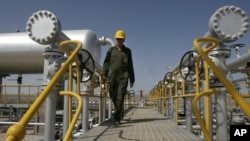Iran’s economy has been hammered by a series of sanctions that have pushed it into recession, slashed the value of its currency, sparked soaring inflation, and hurt its oil sector.
If and when Iran works out a deal with the United States and other nations to limit its nuclear program, some of those sanctions will end.
One economic expert said the end of sanctions could bolster growth in some of Iran’s neighbors and push global oil prices down further.
Peterson Institute for International Relations scholar Gary Hufbauer said ending sanctions could cut oil prices from their current $50 a barrel range to around $35 per barrel.
Crude prices
Hufbauer said after sanctions, Iran could boost production by half a million barrels a day in a few months, and the additional supply could put downward pressure on crude prices worldwide.
While that would not be a large percentage of the approximately 90 million barrels of oil a day consumed by the global economy, Hufbauer said the market is oversupplied right now and is sensitive to additional supplies.
But U.S. Treasury Secretary Jacob Lew said it is a “myth” that Iran’s economy would “instantly recover” because sanctions have pushed it into a “deep hole.”
Lew said sanctions have cost Iran “over $160 billion” in oil revenue since 2012.
The gross domestic product shrank 9 percent in the two years ending in March 2014, and is “15 to 20 percent smaller” than it would have been otherwise.
Lew said Iran needs “half a trillion dollars” in domestic investment.
The U.S. Congressional Research Service said sanctions cut Iran’s oil exports by half, and falling oil prices cut revenue in half again.
Value of currency
The economic problems caused the value of the Iran’s currency, the rial, to fall about 56 percent on unofficial markets, and inflation is estimated to have hit 50 percent at one point.
The departure of a number of foreign oil firms has reduced Iran’s access to the technology needed to update its oil industry, crimping the long-term outlook for the sector.
Sanctions also hurt efforts to modernize Iran’s non-oil industrial sector by blocking access to imported parts and materials.
That is one reason that Peterson Institute scholar Hufbauer said opening up Iran’s economy could provide a welcome boost to business in nearby nations in a region with many troubled economies.
He said the sanctions effort aimed at Iran was effective because of an unusual level of cooperation among other nations.
Also, he added Iran’s economic troubles created the political pressure that prompted the nation’s leaders to bargain with the United States and other nations.




